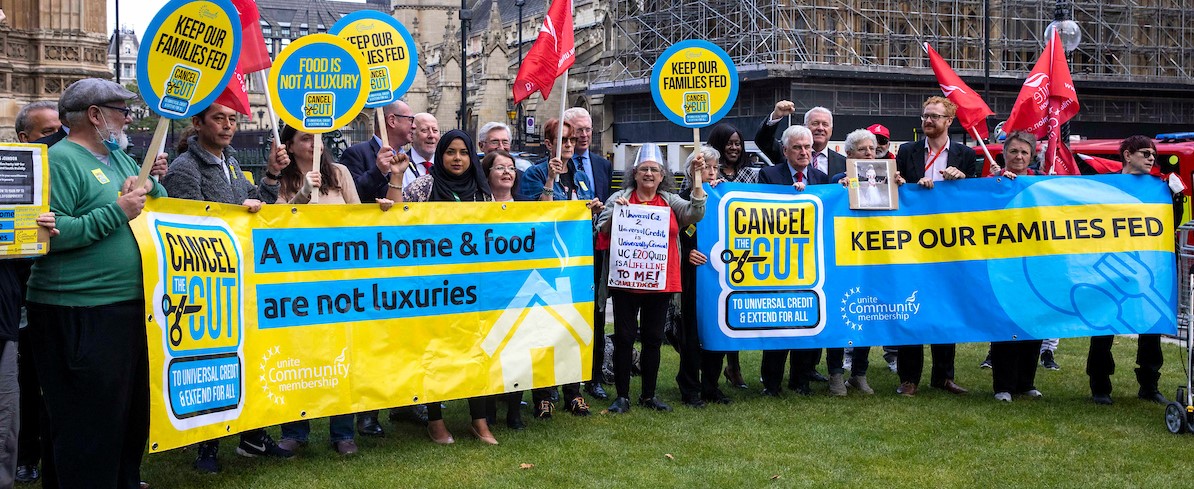Fight for rights
As part of Disability History Month this month, UNITElive will publish one story each day featuring the many Unite members with disabilities who are fighting for a better world for all.
Today, UNITElive speaks to Sean McGovern, who, in addition to his work with Unite, also campaigns with Disabled People Against Cuts (DPAC).
Sean McGovern is a veteran. For more than a quarter of a century he’s been campaigning for disability rights. During his tenure as a trade unionist he has been involved with seminal initiatives that have helped, and continue to help, thousands of disabled people across Britain.
Sean weathered the campaign to get disability access audits established in workplaces. He was there for the amendment of â€clawback’ legislation, that often saw those who had suffered industrial illness or injury lose their compensation because they were forced to claim benefits.
He was a union campaigner during the instigation of â€disability champions’; the precursor to equality reps.
Proposing to Sean, who is chair of the Unite national disabilities committee, that some people see him as an inspiration elicits a gruff response.
“I don’t know about inspirational. I do what I do. Anyway move on,” he says.
But others were quick to speak highly of him, despite not being invited to do so.
“I stand up and admire that man for what he does for disabled people,” said South East region vice-chair Ian Lidbetter.
“He hasn’t let his disability get in his way in any way. In the end he, and others like him, have helped change the laws. Sean fights for everything he believes in.”
Unite national disabilities committee member Marina Gunn was also full of praise.
“What he does for people with disabilities is inspiring and he’s inspiring in himself,” she said. “He has a lot of disabilities, but he doesn’t let that stop him. Sean’s a force to be dealt with.”
Continued struggle
Sean was left paralysed down one side after he was attacked by a gang at 16 and left in a coma, but it wasn’t until his mid-20s that he began campaigning for disability rights.
“As a teenager I didn’t really see myself as disabled,” he says. But as his condition deteriorated Sean saw fighting for disabled people as an extension of his political philosophy.
“As a socialist it was just another avenue of injustice I found myself walking down,” explained Sean. “I’ve always fought injustice where I could, so it just became a stanchion to the way I was.”
Sean cites Unite’s work with the campaign group Disabled People Against Cuts (DPAC) as an example of the continued struggle.
Unite and DPAC helped to force Atos, the company which until last year carried out Work Capability Assessments for the government, to pull out of its contract. Nearly 2500 people died between 2011 and 2014, shortly after they’d been found fit for work by the company.
“We’ll do the same to their successor, Maximus, as well. Once their share price goes down, they’ll think again,” Sean said.
At the forefront
“But probably the biggest thing is that we’re mainstreaming disability. We’re not allowing it to be bolted on as an also man. We’re fighting so that when a shop steward goes to negotiate, disabilities are not just a last issue, they’re actually stitched in from the beginning.”
During UK Disability History Month 2015 the focus is on how disabled people are portrayed in the media.
Sean says media representation is a key factor in educating people on the imperative to mainstream disability. While some progress has been made in this area – “there are more disabled people on TV now” – the scapegoating of people claiming disability benefits continues unabated.
“This year we are putting it at the forefront and arguing the case against the negative portrayal of disabilities in the right wing press.
“Things like the overemphasis of fraudulent disability claims when it’s something like 0.5 percent of the total welfare bill and we know there’s hundreds of billions being cheated in tax,” Sean said. “In the end the press are just following the government’s lead.”
For Sean and others working to improve the rights and conditions of disabled people, this is just one aspect of a long and arduous fight:
“The government are using the equality act to say â€well you’ve got all these things in place, you don’t need these benefits, these services’.
“It’s as though a utopia’s been created and they’re saying â€well let’s just walk away from it.’ But it hasn’t; there’s still so many barriers in place to our movement, to our ability to work and socialise, to our freedom.”
Tomorrow, UNITElive speaks to Unite vice-chair for the South East region Ian Lidbetter about challenging common attitudes towards people with disabilities.
 Like
Like Follow
Follow


